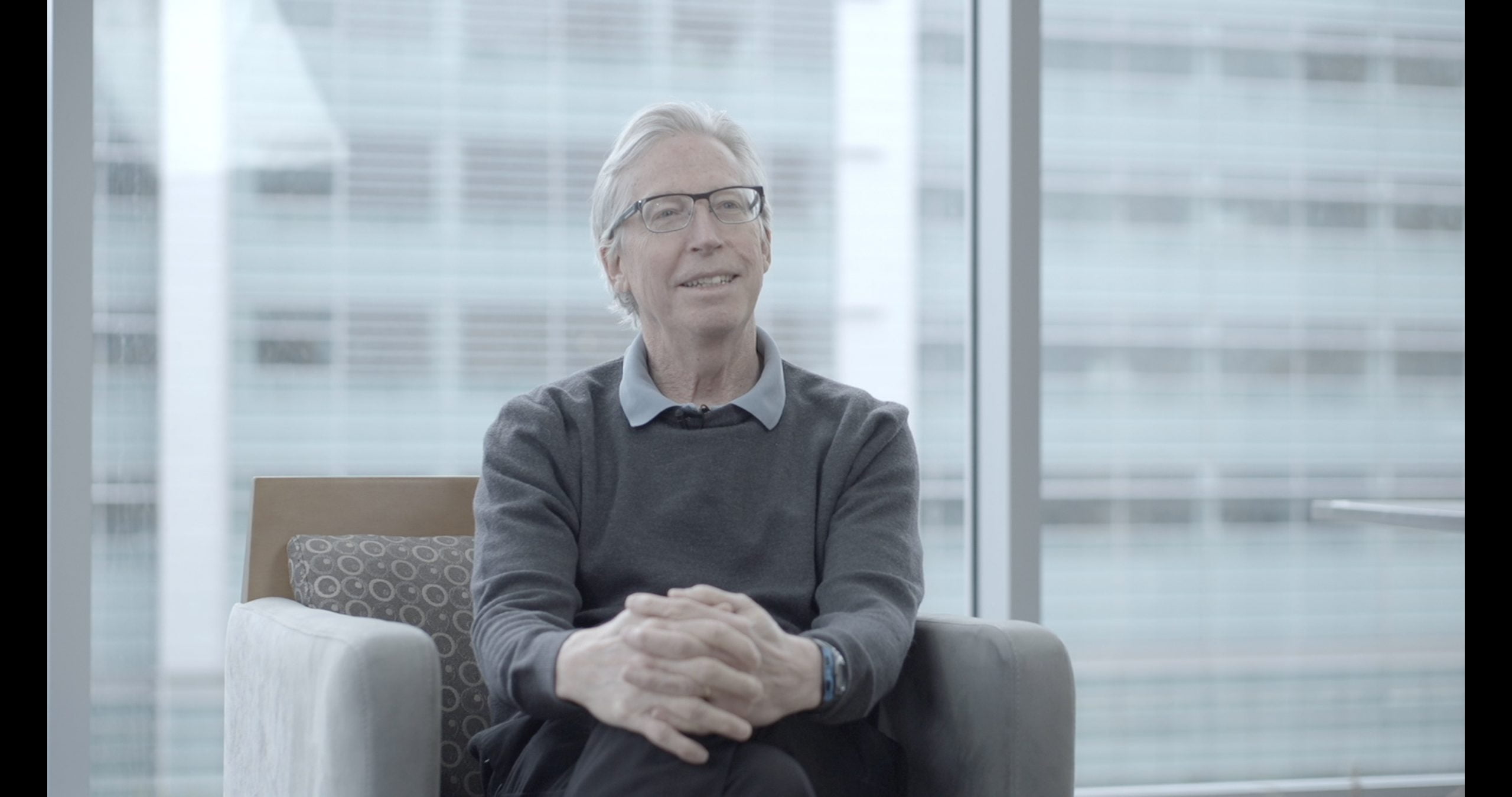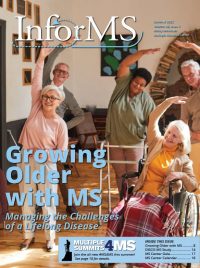
An Interview with Dr. John Corboy, Medical Director of the Rocky Mountain MS Center
The DISCO-MS trial — short for “discontinuing” MS medications — looked at the question “Can we define a population of patients in whom it’s safe to discontinue their disease modifying therapy (DMT) for MS as they age?” In this interview, we sat down with Dr. John Corboy to talk about the study’s results.
InforMS: Please describe the genesis of the DISCO-MS study.
Dr. John Corboy: Several things contributed to the genesis of the DISCO-MS study. First, recognizing the differences that occur in people with MS as they age. Most people are diagnosed with MS in their 30s and 40s with relapsing remitting MS. They have relapses followed by remissions and those tend to diminish with age. Active new lesions on MRI scans also diminish with age. In addition, a significant minority of individuals will go into a slow progressive phase, which is mostly independent of new relapse activity. We know that the natural history of MS changes over time.
Second, several studies have shown that there are various factors that predict response to the presently available disease modifying therapies (DMTs). Those factors are dominated by age, disease duration, and whether you have had recent relapse activity or a recent active scan. There are about 7 studies that have looked at breaking down the different subgroups to see the benefit of DMTs or not. Age is often not necessarily statistically significantly different, but there is a clear trend that older people do not benefit as much as younger people.
Third, and most notably, most of the DMTs that got approval after the phase 3 trials were done with a maximum age of 55. The maximum age in almost every relapsing MS DMT study has been 55, with the median age about 36. In the progressive MS trials, the median age of participants is around 47 even though almost half (46%) of the adult population with MS are ages 55 and above. That means that almost half of people with MS essentially have not been studied, and we don’t even have any data one way or the other whether the DMTs are beneficial for them.
In addition, we now have data from observational trials, which was not available when we started the DISCO-MS study, as to what happens when you stop using medications. Observational studies have looked at the likelihood of disease recurrence, either with a relapse or with worsening disability or new MRI scan changes, if you discontinue your disease modifying therapy. Interestingly, these observational studies have shown that the exact same factors that are relevant for responding to the medications (age, disease duration, and recent disease activity) are the same ones that are relevant for people having recurrence of disease activity should they go off their medication.
The other critical part of the equation is that as people get older, with their MS, perhaps the risk of using some of the more highly effective medications increases. Therefore, it’s not only a question of whether medicine is not working as well, but it is also a question of potential increased risk. And that is especially true as we age, because you are more likely to have infections and various cancers, especially skin cancers, as you age. Evaluating the risk-benefit equation for older adults on DMTs is important.
InforMS: What is the question that the DISCO-MS study was seeking to answer?
Dr. Corboy: The DISCO-MS study (short for discontinuing MS drugs) looked at the question “Can we define a population of patients in whom it’s safe to discontinue their disease modifying therapy (DMT) for MS as they age?”
We looked at a very specific population: Those 55 and older who have had no recent relapse for at least 5 years and no recent new MRI scan lesions for at least 3 years. We asked the simple question: “If you discontinue your DMT, is the outcome inferior to simply staying on your DMT?”
The primary outcome measure was whether or not there was a recurrence of a relapse or a recurrence of any new brain MRI scan lesion. We also looked at other secondary outcome measures, including a change in disability or a worsening persistent disability that was confirmed at 6 months. We also looked at a variety of different patient reported outcomes: Quality of life measures, MS symptom scores, and cognition measures.
More on DISCO-MS:
Summary of DISCO-MS Study Results
DISCO-MS Study: By the Numbers
Dr. Corboy’s DISCO-MS Webinar (YouTube video)
It was very important for us to include the patient perspective in this study. For the study, RMMSC at University of Colorado was awarded a research grant from the Patient Centered Outcomes Research Institute (PCORI) and the National MS Society. PCORI is a private, nonprofit entity developed as an offshoot of the Affordable Care Act and with a goal of advancing patient centered research focusing on comparative effectiveness. Unlike a National Institute of Health (NIH) grant, or other sources of funding, it’s specifically required that you engage patients and related stakeholders − from the design, through the study completion, and including dissemination of information about the research. We began recruiting for this study in May, 2017 (see DISCO-MS Study: By the Numbers, page 16).
RESULTS AND CONCLUSIONS
InforMS: What were the results of the study?
Dr. Corboy: We sought to answer the question: Is discontinuing your DMT no worse than continuing your medication when we look at risk of having a relapse or new brain MRI lesion? While we did not get a perfect answer one way or the other, there are some important takeaways from the data (see Summary of Study Results on page above).
InforMS: What are the most important conclusions from the DISCO-MS Study?
Dr. Corboy: The DISCO-MS study is likely the largest controlled DMT trial ever done in patients with MS who are over the age of 55. With the study, we can conclude that new or worsening clinical activity is uncommon overall and there was no significant difference between those on or off DMT. Relapses were especially uncommon.
There may well be a slight increase in MRI lesions among the discontinue group, but we could not say this with certainty. Notably, almost all the scan changes were just with 1 or 2 lesions as opposed to many new lesions. Recent observational (not controlled) studies have shown that just having 1-2 new brain MRI lesions on a scan after one year on medication is not associated with significant risk of disability progression 5 or 10 years later. In comparison, 3 or more new lesions, an active lesion, or new relapses ARE associated with significant disability progression 5-10 years later. Thus, while we might aim for NO evidence of new disease activity, minimal evidence of new disease activity may well be acceptable functionally.
We also tried to look at whether it made a difference if you discontinued one drug compared to another. The number of events was relatively so small, we really didn’t have an opportunity to show that one or another drug was more dangerous to discontinue.
Individuals who did have new disease activity had the same overall characteristics (average age of 61; mostly female and white; 22 years since onset of MS symptoms) as the overall study group.
We also looked at gadolinium enhancing lesions as an exploratory measure. Only 6 people had enhancing lesions on their scans. These are the active lesions that suggests some activity right now that is acute – just in the last 2-8 weeks. Notably all 6 with active enhancing lesions were in the discontinue group.
Financial issues played a measurable role in this study. In the group that was randomized to stay on the medication, 8 of the 128 people went off their medication because of insurance coverage problems during the study. This may have been exacerbated by the pandemic as well, but over 6% of people, 1 out of every 16 people lost insurance or had a change of insurance that affected their ability to continue to use the medication. This is an ongoing issue with insurance coverage for these incredibly expensive drugs. We continue to have to pay a lot of attention to the financial implications of these medications. These issues play a significant role as people age and perhaps convert over to Medicare and Social Security, as to whether they can continue to use their medications.
Finally, disease modifying therapy discontinuation appears to be a low risk for patients over 55 years of age with a relatively moderate amount of disability. There may well be an increased risk of having mild new disease activity on your scan, but there doesn’t appear to be a substantial increased clinical risk going off medication compared to staying on medication, for the clinical outcome measures of relapse and more disability progression and over 22 months.
All these decisions about potentially stopping DMT then will be independent decisions that every patient makes with their provider when they look at this and other data, and try and answer the question: is it reasonable for me to have a trial off my disease modifying therapy now? There is not going to be one answer based on this study, or even with the addition of the other 2 studies that our colleagues are doing in Europe. However, I think it is a significant component that should help people make that very important decision as they age and have been stable for a long period of time. We are very hopeful that this information will be used in that context going forward.
InforMS: What are the limitations of the DISCO-MS study?
Dr. Corboy: There are several limitations of this study. First, the participants were mostly white women: 90% white, 83% women. All participants were in the United States. We had relatively short follow-up period with an average of 22 months. 75% of participants were still using older drugs (interferons, Copaxone), so it is hard to draw conclusions on highly effective drugs. We also experienced data collection challenges related to the pandemic. In addition, the study did not include brain volume data or biomarker data.



